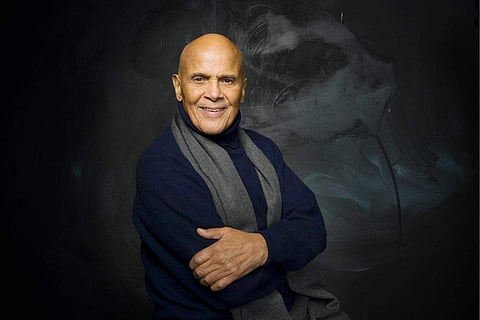
- LIFESTYLE
- FASHION
- FOOD
- ENTERTAINMENT
- EVENTS
- CULTURE
- VIDEOS
- WEB STORIES
- GALLERIES
- GADGETS
- CAR & BIKE
- SOCIETY
- TRAVEL
- NORTH EAST
- INDULGE CONNECT

Harry Belafonte, the civil rights and entertainment giant who began as a groundbreaking actor and singer and became an activist, humanitarian and conscience of the world, has passed away. He was 96. Harry passed away on Tuesday due to congestive heart failure at his New York home, with his wife Pamela by his side, said publicist Ken Sunshine.
With his glowing, handsome face and silky-husky voice, Harry was one of the first Black performers to gain a wide following on film and to sell a million records as a singer; many still know him for his signature hit Banana Boat Song (Day-O), and its call of Day-O! Daaaaay-O. But he forged a greater legacy once he scaled back his performing career in the 1960s and lived out his hero Paul Robeson’s decree that artists are ‘gatekeepers of truth.’
Harry stands as the model and the epitome of the celebrity activist. Few kept up with his time and commitment and none his stature as a meeting point among Hollywood, Washington and the Civil Rights Movement. He not only participated in protest marches and benefit concerts but also helped organise and raise support for them.
He worked closely with his friend and generational peer the Rev. Martin Luther King Jr. He risked his life and livelihood and set high standards for younger Black celebrities, mentoring Usher, Common, Danny Glover and many others. In Spike Lee’s 2018 film BlacKkKlansman, he was fittingly cast as an elder statesman schooling young activists about the country’s past.
Harry was a major artist since the 1950s. He won a Tony Award in 1954 for his starring role in John Murray Anderson’s Almanac and five years later became the first Black performer to win an Emmy for the TV special Tonight with Harry Belafonte.
His Calypso, released in 1955, became the first officially certified million-selling album by a solo performer and started a national infatuation with Caribbean rhythms. The artiste befriended King in the spring of 1956 after the young civil rights leader called and asked for a meeting. They spoke for hours, and Belafonte would remember feeling King raised him to the “higher plane of social protest.” Then at the peak of his singing career, Belafonte was soon producing a benefit concert for the bus boycott in Montgomery, Alabama, that helped make King a national figure. By the early 1960s, he had decided to make civil rights his priority.
When King was assassinated, in 1968, Belafonte helped pick out the suit he was buried in, sat next to his widow, Coretta, at the funeral, and continued to support his family, though they later became estranged. King’s death left Belafonte isolated from the civil rights community. He was turned off by the separatist beliefs of Stokely Carmichael and other “Black Power” activists and had little chemistry with King’s designated successor, The Rev. Ralph Abernathy. But the entertainer’s causes extended well beyond the U.S.
He coordinated Nelson Mandela’s first visit to the U.S. since being released from prison in 1990. A few years earlier, he had initiated the all-star, million-selling “We Are the World” recording, the Grammy-winning charity song for famine relief in Africa.
He was married three times, most recently to photographer Pamela Frank, and had four children. He is also survived by two stepchildren and eight grandchildren. A New York City native, Harry began performing on stage in the 1940s and by the following decade was also singing, finding gigs at the Blue Note, the Vanguard and other clubs — and becoming immersed in folk, blues, jazz and the calypso he had heard while living in Jamaica.
Starting in 1954, he released such top 10 albums as Mark Twain and Other Folk Favorites and Belafonte, and his popular singles included Mathilda, Jamaica Farewell and The Banana Boat Song, a reworked Caribbean ballad that was a late addition to his Calypso record.
Harry made history in 1968 by filling in for Johnny Carson on the Tonight Show for a full week. Later that year, he performed on a pre-taped TV special and was joined by British singer Petula Clark for a performance of the anti-war song On the Path of Glory. Mindful to the end that he grew up in poverty, Harry did not think of himself as an artist who became an activist, but as an activist who happened to be an artist.
Aishwarya Rai reveals her special connection with the name 'Nandini'
Aishwarya Rai wows fans with her outfit during Ponniyin Selvan 2's Star-Studded Promotions
Aryan Khan directs Shah Rukh Khan for his streetwear brand's ad shoot [WATCH]
Brad Pitt to race in British grand prix for his Formula One movie